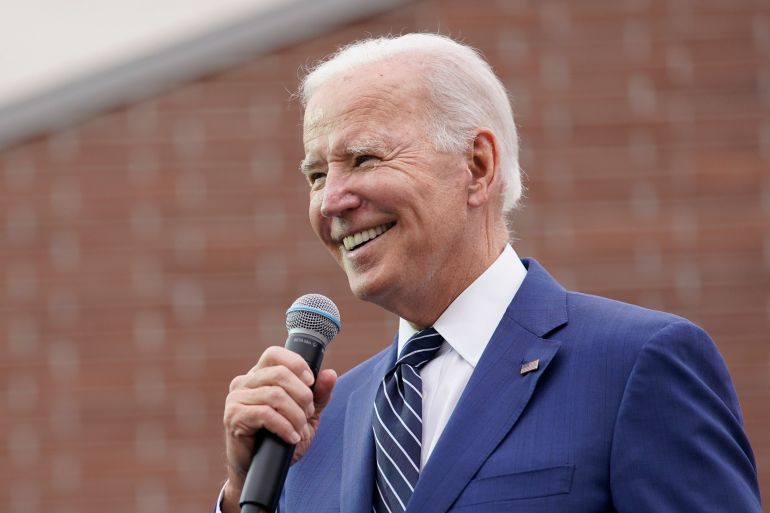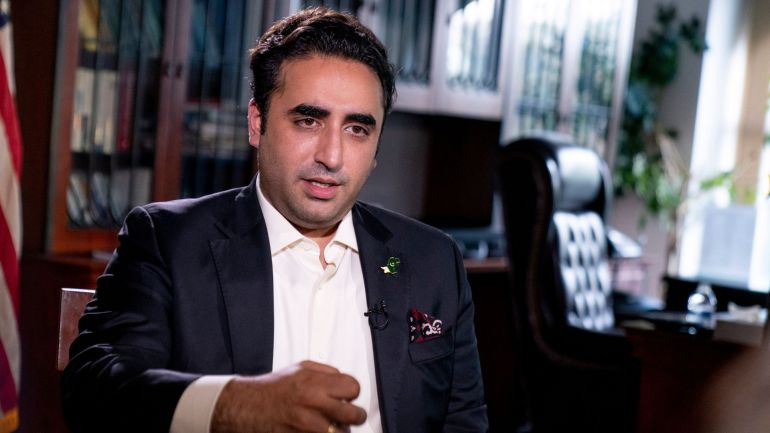Pakistan summons US envoy over Biden’s nuclear remarks
US president said Pakistan is one of the ‘most dangerous’ nations which has ‘nuclear weapons without any cohesion’.

Pakistan’s foreign minister says the US ambassador to the country has been summoned after President Joe Biden said Pakistan “may be one of the most dangerous” countries in the world which had “nuclear weapons without any cohesion”.
The 79-year-old Biden made the comments in a speech at a reception of the Democratic Congressional Campaign Committee on Thursday, in which he also touched upon the war in Ukraine, China and domestic issues.
Keep reading
list of 3 itemsPakistan opposition leader arrested for tweet on military chief
Pakistani court acquits PM, son in money laundering case
Speaking in the context of China and his relationship with President Xi Jinping, Biden said, “This is a guy [Xi Jinping] who understands what he wants but has an enormous, enormous array of problems. How do we handle that? How do we handle that relative to what’s going on in Russia? And what I think is maybe one of the most dangerous nations in the world: Pakistan. Nuclear weapons without any cohesion.”
Pakistan’s foreign minister Bilawal Bhutto-Zardari said on Saturday during a news conference in the southern port city of Karachi that he was “surprised” by Biden’s statement. “I believe this is exactly the sort of misunderstanding that is created when there is a lack of engagement,” he added.

“If there is any question as to nuclear safety, then they should be directed to our neighbour India, who very recently accidentally fired a missile into Pakistani territory,” Bhutto-Zardari said, citing the firing of a supersonic missile into Pakistan on March 9.
The 34-year-old asserted that he did not think the decision to summon Ambassador Donald Blome will negatively affect Islamabad’s relations with the US.
“We will continue on the positive trajectory of engagements we are having so far,” he said.
Pakistan Prime Minister Shehbaz Sharif also rejected Biden’s remarks, asserting his country was a “responsible nuclear state”.
“We are proud that our nuclear assets have the best safeguards as per IAEA requirements. We take these safety measures with the utmost seriousness. Let no one have any doubts,” he tweeted.
Meanwhile on Saturday, White House Press Secretary Karine Jean-Pierre when questioned on Biden’s comments, said the president “views a secure and prosperous Pakistan as critical to US interests”.
The controversy came just more than a week after Pakistan’s military chief, General Qamar Bajwa, made a trip to the US and held high-level meetings with US Secretary of Defense Lloyd Austin and National Security Advisor Jake Sullivan.
Moreover, last month, Sharif thanked Biden for highlighting and urging the international community to help the South Asian nation recover from devastating floods that have affected some 30 million people.
‘Unwarranted’
Former Pakistan Prime Minister Imran Khan on Saturday condemned Biden’s remarks, saying the US president had reached an “unwarranted conclusion”.
“[H]aving been prime minister, I know we have one of the most secure nuclear command and control systems,” he tweeted.
“Unlike the US which has been involved in wars across the world, when has Pakistan shown aggression, especially post-nuclearisation?”
I have 2 Qs on this: 1. On what info has @POTUS reached this unwarranted conclusion on our nuclear capability when, having been PM, I know we have one of the most secure nuclear command & control systems? 2. Unlike the US which has been involved in wars https://t.co/nkIrlekBxQ
— Imran Khan (@ImranKhanPTI) October 15, 2022
Khan said Biden’s statement showed that the current Pakistani government – led by Prime Minister Shahbaz Sharif – was a “total failure” on foreign policy and “its claims of ‘reset of relations with US'”.
Sharif’s brother and former prime minister also criticised the US president’s remarks, saying that Pakistan was a “responsible nuclear state”.
“Pakistan is a responsible nuclear state that is perfectly capable of safeguarding its national interest whilst respecting international law and practices,” Nawaz Sharif said on Twitter.
During the previous decade, Pakistan has steadily moved towards its regional ally China for its economic and defence needs, resulting in a gradual cooling-off in its relationship with Washington.
The relationship between the two nuclear-armed nations worsened as Washington accused Islamabad of providing safe haven to Taliban leaders. Pakistan has repeatedly denied the allegations.
Khan was removed from power in April after an opposition alliance brought a no-confidence motion against his government. The former cricketer-turned-politician has accused the US of conspiring with the opposition.